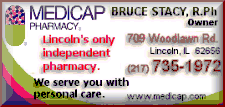|
Memorial is one of the first hospitals in Illinois to install the
dual-source CT scanner from Siemens Medical Solutions. The new
scanner produces images with twice the speed of the most advanced
single-source CT scanners. Siemens' Somatom Definition can complete
an image in 83 milliseconds -- less time than it takes the heart to
beat. The entire scan of a heart takes 10 seconds. "Time is
critical in the emergency department as physicians make potentially
lifesaving decisions," said Dr. David Griffen, medical director of
Memorial's Emergency Department. "This leading-edge scanner allows
us to diagnose and treat our patients more quickly and safely."

The dual-source feature allows physicians to image patients with
elevated or irregular heart rates without having to first administer
beta blocker medication to reduce the heart rate before the exam.
With other CT scanners, patients must take beta blockers to slow the
heart before it can be seen clearly because the motion of the
beating heart can cause blurred images.
"This technology is an enormous benefit to cardiac patients who
weren't able to have CT exams because of conditions that precluded
the use of beta blockers," said Dr. Nasaraiah Nallamothu, a
cardiologist with Prairie Cardiovascular Consultants. Patients with
conditions that affect breathing, such as asthma, chronic bronchitis
and emphysema, could not use beta blockers, which can narrow the air
passages in the lungs and worsen their conditions.
[to top of second column]
 |

In addition to capturing detailed images at much higher speeds,
the scanner also greatly improves diagnostic capabilities while
using techniques to reduce radiation to patients.
"The lowest possible radiation is an important benefit for
patients," said Dr. Andrew Sherrick, a radiologist with Clinical
Radiologists, S.C. "The speed of the system allows physicians to
obtain images in half the time." Special software that automatically
reduces radiation to the lowest possible dose for the patient is
used.
"The ability to diagnose patients quickly and accurately in the
acute-care setting enables us to avoid unnecessary admissions for
further testing for some patients and to detect serious disease in
other patients initially thought to be safe to go home," Griffen
said.
The scanner is also large enough and powerful enough to exam
obese patients, who may not fit comfortably in traditional CT
scanners and who present difficulties in obtaining richly detailed
images. Nearly two-thirds of adults older than 20 years in the
United States are now overweight, and 30 percent of those
individuals are obese, according to the Centers for Disease Control
and Prevention.
Memorial Medical Center, 701 N. First St., is a not-for-profit,
community-based hospital in the Illinois Medical District at
Springfield.
[Text from news release received from
Memorial Medical
Center]
|